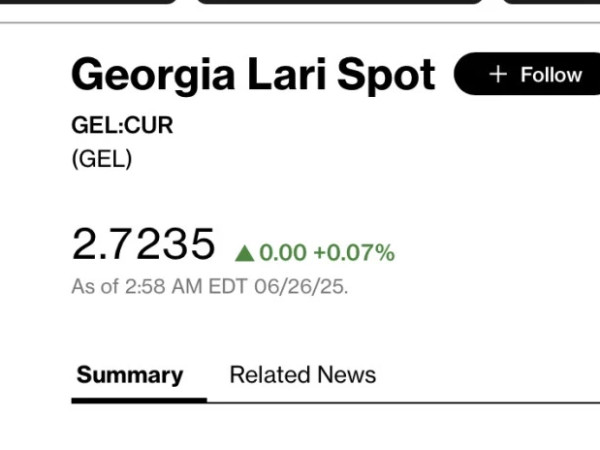As Georgia’s relations with the United States and the European Union deteriorate, the Georgian Dream is strengthening its alliances with authoritarian regimes hostile to the United States, such as China. The Georgia-China strategic partnership agreement, signed in 2023, appears to be a turning point in the relationship between the two countries, significantly deepening their cooperation.[1] At the narrative level, China offers political support to the ruling Georgian Dream party by characterizing it as enforcing policies of 'peace, stability, and development’, while Georgian officials increasingly portray China as a strong partner and an alternative to the West. As an example, in October 2024, Georgian Dream Prime Minister Irakli Kobakhidze praised China as one of the “best examples of state modernization,” emphasizing that China sets a positive example for other global powers.
At the practical level, cooperation has accelerated following the visa-free agreement, with both countries expanding direct flights, resulting in a noticeable rise in Chinese tourist arrivals and an increase in Chinese business activity in Georgia; Georgia has also actively adopted Chinese surveillance technology; Furthermore, the central banks of both countries are actively working to strengthen ties, particularly in monetary policy collaboration, and Chinese payment systems may potentially enter the Georgian market. Most recently, the Georgian Dream announced its plans to introduce the Chinese language into the school curriculum.
Increased Economic Relations
In 2013-2024, Georgia’s economic relations with China increased significantly[4]:
Chinese citizens registered 1,893 companies in Georgia, 4 times more than it was before 2013. In 2024, a record 291 new Chinese companies were registered.
FDI from China increased 5 times compared to 2003 - 2012 and amounted to 600 mln USD. At the same time, FDI peaked in 2014 and has declined since[5].
Annual trade turnover with China increased 3 times since 2012 and amounted to 2 bln USD. In 2024, China was Georgia’s fourth-largest trading partner, accounting for 8.2% of Georgia’s overall trade.
In 2024, a bilateral visa exemption agreement was signed between the Government of Georgia and the Government of China. As a result, visits to Georgia from China rose sharply by 83% in 2024. The number of visits from China reached 88.6 thousand. There has also been a notable increase in flights from Chinese airlines to Georgia.
Many large-scale infrastructure projects in Georgia are being implemented by Chinese companies, including state-owned enterprises. In addition to the Anaklia port project, the Chinese side has expressed interest in developing a new airport in Vaziani, a site formerly used as a military base. According to the Ambassador, numerous Chinese companies have shown interest, and China will continue to monitor and support the project closely.
Cooperation with Chinese Companies that Pose National Security Risk to the United States
Perhaps most alarming is the fact that several Chinese companies operating in Georgia have faced significant scrutiny and restrictions from U.S. authorities due to national security concerns and alleged ties to the Chinese military:
China Communications Construction Company Limited (CCCC)
China Communications Construction Company Limited (CCCC), which was awarded the right to build the Anaklia Port by the Georgian Dream can be found in the Office of Foreign Assets Control (OFAC) Non-SDN Chinese Military-Industrial Complex Companies List. The Department of Treasury also lists the company in the Non-SDN CMIC List.
The Department of Defense has identified CCCC as a ‘Chinese military company’ operating directly or indirectly in the United States, in accordance with the statutory requirement of Section 1260H of the National Defense Authorization Act for Fiscal Year 2021].
Former U.S. Secretary of State Mike Pompeo stated: “CCCC and its subsidiaries have engaged in corruption, predatory financing, environmental destruction, and other abuses across the world... The PRC must not be allowed to use CCCC and other state-owned enterprises as weapons to impose an expansionist agenda”.
China Railway 23rd Bureau Group
China Railway 23rd Bureau Group is engaged in building a highway in Georgia. According to the World Bank, it is a subsidiary of China Railway Construction Corporation Ltd. (CRCC). China Railway Construction Corporation Limited is included in the U.S. Treasury’s NS-CMIC List, subjecting it to investment prohibitions.
In 2020, the United States Department of Defense listed CRCC as a Chinese military company under Section 1260H, indicating its association with China’s military-industrial complex.
Huawei
Huawei, a company that has been subjected to multiple sanctions from the United States over the past 5 years, is actively present in Georgia. As of 2020, Georgian Members of Parliament were using 200 Huawei tablets. In 2017, Liang Dongbo, the General Manager of Huawei Tbilisi, stated that up to 75% of the communication and mobile networks in the Georgian market had been built by Huawei. The Georgian Dream party has stated that it is eager to explore potential partnerships with the company.
Chinese Connections of Georgian Dream founder Bidzina Ivanishvili
It just so happens that Bidzina Ivanishvili, founder of the Georgian Dream and Georgia’s shadow ruler, as well as his closest business associate (Ivane Chkhartishvili) and highest level party officials (former Prime Minister Irakli Gharibashvili) have had personal business ties with another problematic Chinese company CEFC China Energy.
CEFC China Energy owns 75% of the Poti Free Industrial Zone LLC. The operation of the Industrial Zone largely depends on the cargo turnover of the biggest sea port of Georgia - Poti Port. Bidzina Ivanishvili and his business associate Ivane Chkhartishvili own 50% of a company that manages the 75% share owned by CEFC China Energy.
In 2017, one of the heads of CEFC, Patrick Ho, was arrested in New York. He was charged with bribing officials in African countries to promote the interests of the Chinese company. CEFC was also accused of trading in weapons and evading sanctions imposed on Iran. At the time when CEFC was already involved in international corruption scandals, in February 2018, Georgia’s former Prime Minister Irakli Gharibashvili was appointed an advisor to the Supervisory Board of the company.
Ivane Chkhartishvili, who is the executive director of the Georgia-China Economic and Cultural Development Centre (founded in 2016), was involved in negotiations on CEFC’s entry to Georgia. The Georgian Chamber of Commerce and Industry and the Georgia-China Economic and Cultural Development Centre jointly founded the Georgia-China Friendship Association, electing Jianjun Zang, the executive director of CEFC China Energy, as its honorary president on 18 October 2016.
Other Major Chinese Companies Operating in Georgia
The majority of the top 10 Chinese companies in Georgia by turnover are engaged in infrastructure projects such as building highways, roads, and bridges across the country. These include:
Guizhou Highway Engineering Group Co, Georgian branch (China: 9152000021441520K)
Sinohydro LLC Corporation, Georgian branch (China: 911100007109331046)
China Railway 23rd Bureau Group Ltd, Georgian branch (China: 91510100740338242L)
China Railway Tunnel Group Co, Ltd, Georgian branch (China: 91410300171075680N)
Hunan Roads and Bridges Construction Group LLC, Georgian branch (China: 91430000183763763N)
China Geo-Engineering Corporation, Georgian branch (China: 911100001000009805)
Georgia branch of China Road and Bridge Corporation, Georgian branch (China: 911100007109338178)
China State Construction Engineering Corporation Ltd., Georgian branch (China: 911100007109351850)
The other companies in the top 10 are:
JSC Hualing International Special Economic Zone (Owner: Xiaojin Shao, 01092004214, EJ5293184)
JSC BasisBank (Georgian-based BasisBank has operated since 1993. In 2012, the Chinese Hualing Group purchased the bank’s shares. Ownership stood at 92.3% as of 2017.)
Some of these companies have been sanctioned by the World Bank or other countries, however not by the United States.
Law Enforcement Cooperation
Georgia and China are working to strengthen law enforcement cooperation. Georgian officials have held meetings with representatives of Chinese law enforcement agencies. During a meeting with Georgia’s Deputy Prime Minister and Minister of Internal Affairs, Vakhtang Gomelauri, the Chinese Ambassador to Georgia, Zhou Qian, stated: “Exchanges between law enforcement departments are an important part of China-Georgia cooperation, and China is willing to further strengthen pragmatic cooperation with Georgia in areas such as police exchanges and combating transnational crime.”
Chinese Surveillance Systems
It is also noteworthy that, reportedly, an estimated 70–80% of Georgia’s state institutions are equipped with Chinese-made surveillance cameras. The majority of these cameras, operated under state control, are produced by two Chinese companies under international sanctions: Hikvision and Dahua Technology. Notably, Tbilisi City Hall uses Chinese-developed software, HikCentral, to manage and support its Hikvision surveillance systems.
In terms of procurement, the Central Election Commission of Georgia reportedly spent the most on this surveillance equipment, with expenditures totaling 1,709,212 GEL (app. 630,000 USD).
In October, the Chinese government donated X-ray inspection systems to Georgian customs free of charge. The equipment was provided by the Chinese company Nuctech. Notably, in 2020, the United States added Nuctech (Tongfang NucTech Technology Ltd.) to the Bureau of Industry and Security Entity List, citing national security concerns and thereby restricting exports to the company.
5G
As of 2024, 5G has been developed in Georgia; however, no public reports seem to have been released detailing the network’s development or deployment progress. Interestingly, during a speech highlighting China’s projects and achievements in Georgia, without adding any further details the Chinese Ambassador to Georgia stated the following: “2024 was a year of numerous significant achievements for Chinese enterprises in Georgia… Bids were won successively in the fields of wind energy, photovoltaic, and other new energy sectors. 5G equipment was comprehensively deployed in Georgia…”
Chinese Banks
In March, a Memorandum of Understanding was signed between the National Bank of Georgia and the People’s Bank of China to expand bilateral cooperation. Under the memorandum, the two central banks agreed to collaborate on monetary policy and to exchange information and expertise in areas such as financial technologies, payment systems, and securities market development.
The agreement also includes plans to implement joint projects and promote the development of banking services between the two countries. A key focus will be the development and modernization of payment infrastructure, with special attention given to enhancing the interconnection of payment systems to enable faster, more efficient, and secure international transactions.
Earlier, in October, the Head of the Financial and Supervisory Technology Development Department at the National Bank of Georgia attended the Financial Street Forum 2024: Fintech Bridging the Digital Divide in China. During the event, the potential for future collaboration between the Chinese Alipay and the Georgian financial market was discussed, including plans to explore regional opportunities.
Meanwhile, the Chinese Ambassador to Georgia emphasized that deeper financial cooperation between the two countries could stimulate trade, investment, and the construction of large-scale projects. He also noted that such cooperation would help enhance the countries’ ability to resist external financial risks and strengthen overall economic resilience.


















